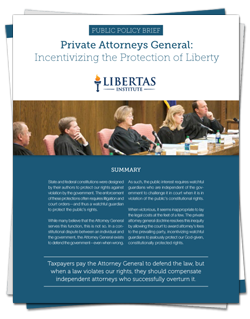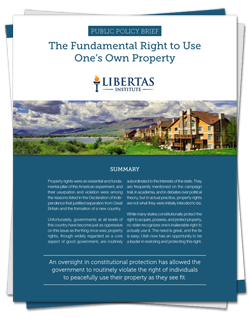Private Attorneys General: Incentivizing the Protection of Liberty
Authored by Josh Daniels, Director of Policy
 State and federal constitutions were designed by their authors to protect our rights against violation by the government. The enforcement of these protections often requires litigation and court orders—and thus a watchful guardian to protect the public’s rights.
State and federal constitutions were designed by their authors to protect our rights against violation by the government. The enforcement of these protections often requires litigation and court orders—and thus a watchful guardian to protect the public’s rights.
While many believe that the Attorney General serves this function, this is not so. In a constitutional dispute between an individual and the government, the Attorney General’s primary duty is to defend the government—even when wrong. As such, the public interest requires watchful guardians who are independent of the government to challenge it in court when it is in violation of the public’s constitutional rights.
When victorious, it seems inappropriate to lay the legal costs at the feet of a few. The private attorney general doctrine resolves this inequity by allowing the court to award attorney’s fees to the prevailing party, incentivizing watchful guardians to jealously protect our God-given, constitutionally protected rights.
Read the briefThe Fundamental Right to Use One’s Own Property
Authored by Josh Daniels, Director of Policy
 Property rights were an essential and fundamental pillar of the American experiment, and their usurpation and violation were among the reasons listed in the Declaration of Independence that justified separation from Great Britain and the formation of a new country.
Property rights were an essential and fundamental pillar of the American experiment, and their usurpation and violation were among the reasons listed in the Declaration of Independence that justified separation from Great Britain and the formation of a new country.
Unfortunately, governments at all levels of this country have become just as oppressive on this issue as the King once was; property rights, though widely regarded as a core aspect of good government, are routinely subordinated to the interests of the state. They are frequently mentioned on the campaign trail, in academia, and in debates over political theory, but in actual practice, property rights are not what they were initially intended to be.
While many states constitutionally protect the right to acquire, possess, and protect property, no state recognizes one’s inalienable right to actually use it. The need is great, and the fix is easy; Utah now has an opportunity to be a leader in restoring and protecting this right.
Read the briefFarms, Food, and Freedom: Informed Consumerism in Utah
Authored by Connor Boyack, President
 As industrialization of America’s food system has increased in the past half a century, so too has its centralization. The average person has become almost totally disconnected from their food supply.
As industrialization of America’s food system has increased in the past half a century, so too has its centralization. The average person has become almost totally disconnected from their food supply.
This distance between farm and fork has led to a lengthy list of regulations, intended to protect the health of the uninformed consumer who does not, and cannot, know anything about the safety, security, or quality of what they are buying.
Such regulations are unnecessary, and therefore should not be required, of producers who sell directly to informed consumers who can either inspect the farm’s assets and processes, or buy a product knowing that it is free of regulation.
Freeing up small farmers will increase their number, reduce restrictive compliance costs, and protect the freedom of both parties, thereby confining regulation to its proper domain.
Read the briefOverreaching EPA Water Rule: Utah Property Rights In Peril
Authored by Josh Daniels, Director of Policy
The EPA has recently adopted a final rule to redefine the term “waters of the United States” in the Clean Water Act in a way that would expand the agency’s regulatory authority to many intrastate waters.
This rule threatens the property rights of Utahns across the state as it would allow federal agencies to impose permit requirements on the most routine industrial or agricultural activities when it concerns even the most insignificant bodies of water.
This rule exceeds the intended limits set by Congress, violates 10th Amendment principles, and is an assault on property rights and Utah’s economy.
Utah should actively oppose this federal bureaucratic overreach by refusing to comply with the EPA’s new rule and also by prohibiting state agencies from cooperating.
Read the briefIncome Tax Credit for Home-schooling Families
The Utah Constitution requires 100% of the state income tax to be used as revenue for government education services—“public” and “higher” education.
Families who choose to educate their children outside of this taxpayer-funded system must therefore pay for the education of others’ children before their own. Curriculum, learning kits, field trips, travel costs, and other necessary expenses are post-tax costs. The state, by imposing an income tax, requires these families to financially prioritize the education of other children first.
To encourage behavior by and minimize the tax burden on select segments of the citizenry, certain tax credits are currently offered by the state. Examples include adopting a special needs child, employing a veteran, or contributing to a medical savings account. We believe that home-schooling families should be added to this list, given the income tax’s direct connection to education funding. If these families do not utilize public schools, their mandate to help fund them should be reduced. These families will still be required to fund the public education system through property and federal taxes; our proposal only addresses the Utah state income tax.
Many parents claim enough deductions and/or credits that leads to their income tax burden being significantly reduced, if not eliminated. Our proposed tax credit would not apply to such situations, as it is a nonrefundable credit—money will not be given to families as a subsidy. If they owe no income tax, then they will receive no benefit. The credit only applies to those who do owe the tax.
These deductions may not always be in place, however. One Utah legislator has proposed eliminating the personal deduction, which would significantly increase the tax burden upon large home-schooling families—thereby making it even more difficult for them to fund their children’s educational needs.
Before helping to pay for the school costs of other children, Utah families should be allowed to meet their own family’s needs, and the current tax structure does not allow for this. Our proposal helps to remedy this imbalance.
Read the briefLaw Enforcement Transparency
Governor Herbert has stated, “Taxpayers and citizens have a right to know where every tax dollar goes and how it is spent, and state government has a responsibility to be accountable and open to constituents.” He continued: “On balance, we have made great strides toward more openness and transparency in government. That’s evident by enhanced web reporting and the installation of a government records ombudsman. But we will not back off our commitment to do better.”
We believe that the government can do better.
Serving as the people’s representatives, Utah lawmakers can only respond to any problems that may exist to the extent that they understand these problems. This understanding requires information—how the process currently works, how it’s being abused, how it’s falling short, etc. If this information is not available, then legislators cannot realize and respond to problematic areas in public policy.
This bill proposal does not seek to restrain officers in their work. Instead, we believe it is necessary to better inform lawmakers, and the public at large, regarding how police officers are using their authority to enforce the law. We agree with Governor Herbert that the government, including law enforcement, must “be accountable and open.” This bill proposal facilitates that objective.
We sincerely hope that such transparency will reveal no problems. Of course, whether problems exist or not is a secondary concern—transparency in the enforcement of the law is a needed step to help ensure the public can have an informed trust of the police.
Read the brief